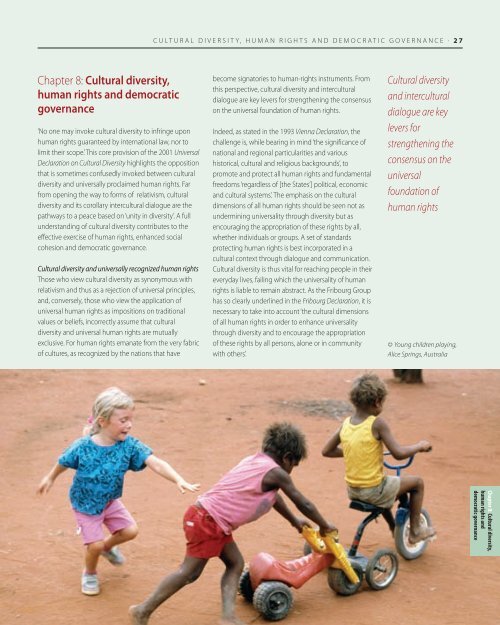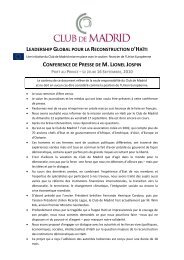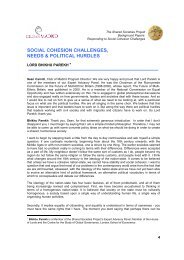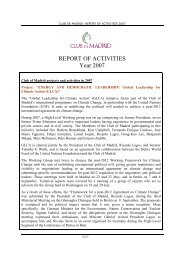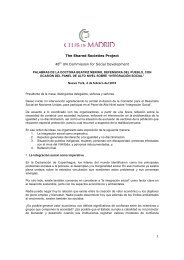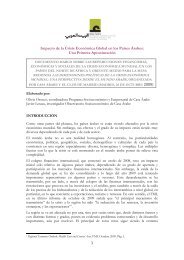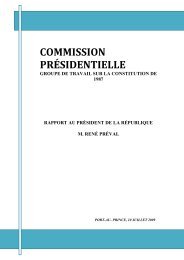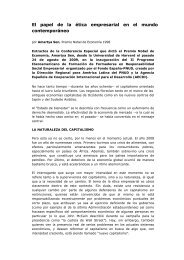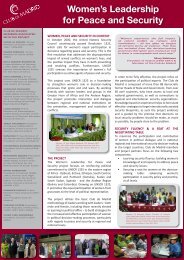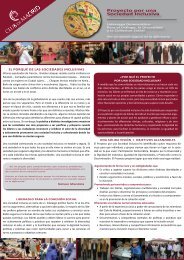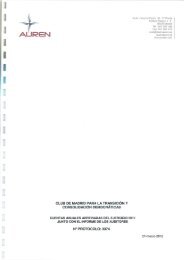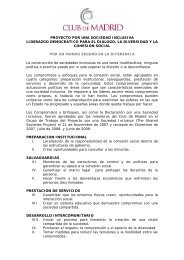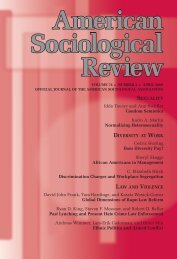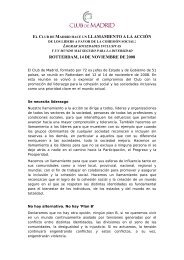Investing cultural diversity and intercultural dialogue - Business and ...
Investing cultural diversity and intercultural dialogue - Business and ...
Investing cultural diversity and intercultural dialogue - Business and ...
Create successful ePaper yourself
Turn your PDF publications into a flip-book with our unique Google optimized e-Paper software.
CULTURAL DIVERSITY, HUMAN RIGHTS AND DEMOCRATIC GOVERNANCE . 27<br />
Chapter 8: Cultural <strong>diversity</strong>,<br />
human rights <strong>and</strong> democratic<br />
governance<br />
‘No one may invoke <strong>cultural</strong> <strong>diversity</strong> to infringe upon<br />
human rights guaranteed by international law, nor to<br />
limit their scope.’ This core provision of the 2001 Universal<br />
Declaration on Cultural Diversity highlights the opposition<br />
that is sometimes confusedly invoked between <strong>cultural</strong><br />
<strong>diversity</strong> <strong>and</strong> universally proclaimed human rights. Far<br />
from opening the way to forms of relativism, <strong>cultural</strong><br />
<strong>diversity</strong> <strong>and</strong> its corollary inter<strong>cultural</strong> <strong>dialogue</strong> are the<br />
pathways to a peace based on ‘unity in <strong>diversity</strong>’. A full<br />
underst<strong>and</strong>ing of <strong>cultural</strong> <strong>diversity</strong> contributes to the<br />
effective exercise of human rights, enhanced social<br />
cohesion <strong>and</strong> democratic governance.<br />
Cultural <strong>diversity</strong> <strong>and</strong> universally recognized human rights<br />
Those who view <strong>cultural</strong> <strong>diversity</strong> as synonymous with<br />
relativism <strong>and</strong> thus as a rejection of universal principles,<br />
<strong>and</strong>, conversely, those who view the application of<br />
universal human rights as impositions on traditional<br />
values or beliefs, incorrectly assume that <strong>cultural</strong><br />
<strong>diversity</strong> <strong>and</strong> universal human rights are mutually<br />
exclusive. For human rights emanate from the very fabric<br />
of cultures, as recognized by the nations that have<br />
become signatories to human-rights instruments. From<br />
this perspective, <strong>cultural</strong> <strong>diversity</strong> <strong>and</strong> inter<strong>cultural</strong><br />
<strong>dialogue</strong> are key levers for strengthening the consensus<br />
on the universal foundation of human rights.<br />
Indeed, as stated in the 1993 Vienna Declaration, the<br />
challenge is, while bearing in mind ‘the significance of<br />
national <strong>and</strong> regional particularities <strong>and</strong> various<br />
historical, <strong>cultural</strong> <strong>and</strong> religious backgrounds’, to<br />
promote <strong>and</strong> protect all human rights <strong>and</strong> fundamental<br />
freedoms ‘regardless of [the States’] political, economic<br />
<strong>and</strong> <strong>cultural</strong> systems’. The emphasis on the <strong>cultural</strong><br />
dimensions of all human rights should be seen not as<br />
undermining universality through <strong>diversity</strong> but as<br />
encouraging the appropriation of these rights by all,<br />
whether individuals or groups. A set of st<strong>and</strong>ards<br />
protecting human rights is best incorporated in a<br />
<strong>cultural</strong> context through <strong>dialogue</strong> <strong>and</strong> communication.<br />
Cultural <strong>diversity</strong> is thus vital for reaching people in their<br />
everyday lives, failing which the universality of human<br />
rights is liable to remain abstract. As the Fribourg Group<br />
has so clearly underlined in the Fribourg Declaration, it is<br />
necessary to take into account ‘the <strong>cultural</strong> dimensions<br />
of all human rights in order to enhance universality<br />
through <strong>diversity</strong> <strong>and</strong> to encourage the appropriation<br />
of these rights by all persons, alone or in community<br />
with others’.<br />
Cultural <strong>diversity</strong><br />
<strong>and</strong> inter<strong>cultural</strong><br />
<strong>dialogue</strong> are key<br />
levers for<br />
strengthening the<br />
consensus on the<br />
universal<br />
foundation of<br />
human rights<br />
K Young children playing,<br />
Alice Springs, Australia<br />
Chapter 8: Cultural <strong>diversity</strong>,<br />
human rights <strong>and</strong><br />
democratic governance


